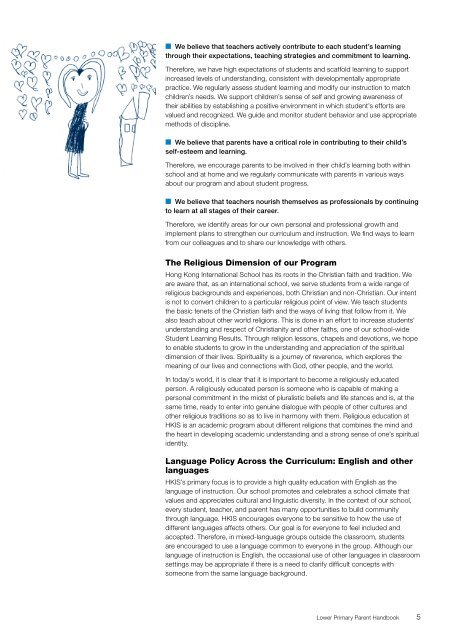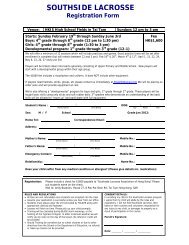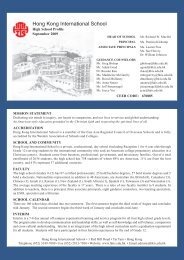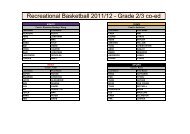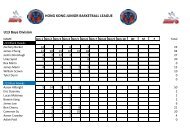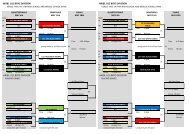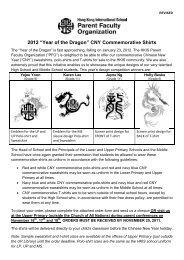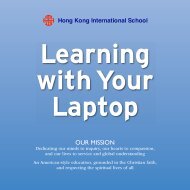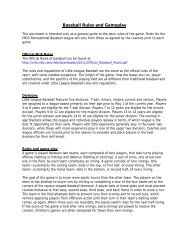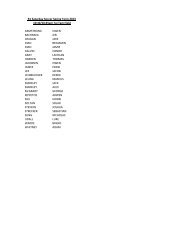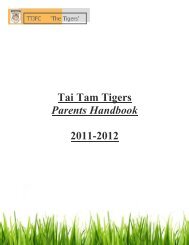Lower Primary School Parent Handbook - DragonNet - Hong Kong ...
Lower Primary School Parent Handbook - DragonNet - Hong Kong ...
Lower Primary School Parent Handbook - DragonNet - Hong Kong ...
You also want an ePaper? Increase the reach of your titles
YUMPU automatically turns print PDFs into web optimized ePapers that Google loves.
n We believe that teachers actively contribute to each student’s learning<br />
through their expectations, teaching strategies and commitment to learning.<br />
Therefore, we have high expectations of students and scaffold learning to support<br />
increased levels of understanding, consistent with developmentally appropriate<br />
practice. We regularly assess student learning and modify our instruction to match<br />
children’s needs. We support children’s sense of self and growing awareness of<br />
their abilities by establishing a positive environment in which student’s efforts are<br />
valued and recognized. We guide and monitor student behavior and use appropriate<br />
methods of discipline.<br />
n We believe that parents have a critical role in contributing to their child’s<br />
self-esteem and learning.<br />
Therefore, we encourage parents to be involved in their child’s learning both within<br />
school and at home and we regularly communicate with parents in various ways<br />
about our program and about student progress.<br />
n We believe that teachers nourish themselves as professionals by continuing<br />
to learn at all stages of their career.<br />
Therefore, we identify areas for our own personal and professional growth and<br />
implement plans to strengthen our curriculum and instruction. We find ways to learn<br />
from our colleagues and to share our knowledge with others.<br />
the Religious Dimension of our Program<br />
<strong>Hong</strong> <strong>Kong</strong> International <strong>School</strong> has its roots in the Christian faith and tradition. We<br />
are aware that, as an international school, we serve students from a wide range of<br />
religious backgrounds and experiences, both Christian and non-Christian. Our intent<br />
is not to convert children to a particular religious point of view. We teach students<br />
the basic tenets of the Christian faith and the ways of living that follow from it. We<br />
also teach about other world religions. This is done in an effort to increase students’<br />
understanding and respect of Christianity and other faiths, one of our school-wide<br />
Student Learning Results. Through religion lessons, chapels and devotions, we hope<br />
to enable students to grow in the understanding and appreciation of the spiritual<br />
dimension of their lives. Spirituality is a journey of reverence, which explores the<br />
meaning of our lives and connections with God, other people, and the world.<br />
In today’s world, it is clear that it is important to become a religiously educated<br />
person. A religiously educated person is someone who is capable of making a<br />
personal commitment in the midst of pluralistic beliefs and life stances and is, at the<br />
same time, ready to enter into genuine dialogue with people of other cultures and<br />
other religious traditions so as to live in harmony with them. Religious education at<br />
HKIS is an academic program about different religions that combines the mind and<br />
the heart in developing academic understanding and a strong sense of one’s spiritual<br />
identity.<br />
Language Policy Across the Curriculum: english and other<br />
languages<br />
HKIS’s primary focus is to provide a high quality education with English as the<br />
language of instruction. Our school promotes and celebrates a school climate that<br />
values and appreciates cultural and linguistic diversity. In the context of our school,<br />
every student, teacher, and parent has many opportunities to build community<br />
through language. HKIS encourages everyone to be sensitive to how the use of<br />
different languages affects others. Our goal is for everyone to feel included and<br />
accepted. Therefore, in mixed-language groups outside the classroom, students<br />
are encouraged to use a language common to everyone in the group. Although our<br />
language of instruction is English, the occasional use of other languages in classroom<br />
settings may be appropriate if there is a need to clarify difficult concepts with<br />
someone from the same language background.<br />
<strong>Lower</strong> <strong>Primary</strong> <strong>Parent</strong> <strong>Handbook</strong> 5


